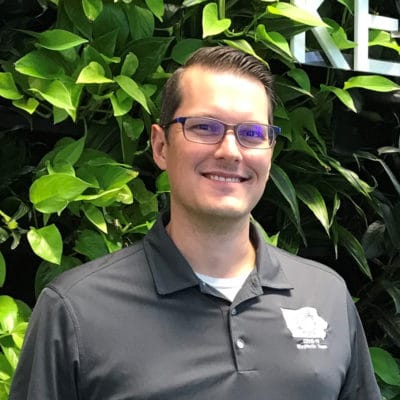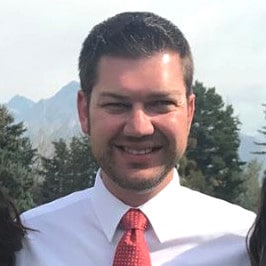Ryan Dow, M.P.H.’12, M.H.A.’12, led a team at a major Iowa-based agriscience company to implement a massive coronavirus testing program. Three states to the west, Braden Ainsworth, M.P.H.’12, pivoted his public health care role to join the pandemic response.
In March 2020, as coronavirus cases began to rise worldwide, Ryan Dow, M.P.H.’12, M.H.A.’12, and his colleagues at Corteva Agriscience saw a need to dramatically increase the availability of reliable, affordable COVID-19 tests. An all-volunteer group of company employees rose to the challenge by executing “Project Upstanding – the COVID-19 Diagnostic Project.” Dow, who works in environmental health, safety and security at the company, was a key project leader.

“One of the biggest challenges in the beginning of the pandemic was the urgent need for high-quality quick turn-around testing of potential CoV-SARS2 cases,” he says. “We didn’t need to get involved with that from a business perspective, but from the perspective of partnering with society, we absolutely needed to do this.”
Corteva Agriscience runs millions of polymerase chain reaction (PCR) tests per day in support of developing new agricultural products, so it had all the expertise, equipment and protocols to help with mass COVID-19 testing. A PCR test detects genetic material from a specific organism, such as a virus, and is considered the “gold standard” test for diagnosing the coronavirus. While the company hadn’t performed clinical lab PCR testing previously, it was quickly certified through the Clinical Laboratory Improvement Amendments (CLIA) required by the Centers for Medicare and Medicaid Services for all laboratory testing, except for research, performed on humans.
“In the span of 17 days we set up a CLIA-certified lab and began running PCR testing for many of the area hospitals with over 99 percent of all results returned within a 24-hour period,” Dow says. “Eventually, we were able to extend our testing to other organizations such as nursing homes and universities. This resulted in hundreds of thousands of tests being conducted over the course of the project.”
It was a 24-7 effort by the team, he adds. In March, the Iowa Biotech Association honored Project Upstanding team members with the 2021 Iowa Biotech Leader Award – typically given to individuals – for demonstrating leadership in the industry and bringing innovative technology products and services to the marketplace.
“I can’t say enough about the team,” Dow says. “It was amazing what the people who work in our lab have done on top of their regular jobs.”
From tobacco use reduction to COVID-19 response
As the program manager of the Utah Department of Health’s tobacco prevention and control program, Braden Ainsworth, M.P.H.’12, leads a team of 16 staff in offering comprehensive services to help tobacco users quit, prevent youth from starting to use tobacco, protect citizens from secondhand smoke and to eliminate tobacco-related disparities.

His role changed in March 2020 when he became the leader of one of the department’s teams that executed and operated a web chat tool, at coronavirus.utah.gov, that served as a virtual COVID-19 hotline.
“People had a wide variety of questions, from what to do if they had symptoms to whether they could travel safely to whether COVID can survive in the microwave,” he says.
He and his colleagues had had a sort of practice run in 2019, when the CDC, the U.S. Food and Drug Administration and state and local health departments worked to respond to an outbreak of e-cigarette, or vaping, product use-associated lung injury (EVALI). COVID-19, of course, was a much greater outbreak, with rapidly changing guidelines and response strategies.
“As the science evolved, the message had to change. That was challenging,” he says. While many chat users were grateful for the information, some were baldly terrified; others were outright rude.
“I had to watch out for the mental health of the team, if someone needed to take a break or forward a message to me,” he says. “We all went into public health not because they’re super-lucrative positions, but because we’re empathetic and want to do things to save people’s lives.”
While he’s back in his role with the tobacco program, Ainsworth is proud of his COVID-19 response team’s work. From March 2020 to March 2021, staff responded to 121,045 unique chats through the website tool.
“I think ultimately we helped a lot of people and alleviated a lot of fear,” he says. “I also would like to think we helped reduce the number of cases.”

